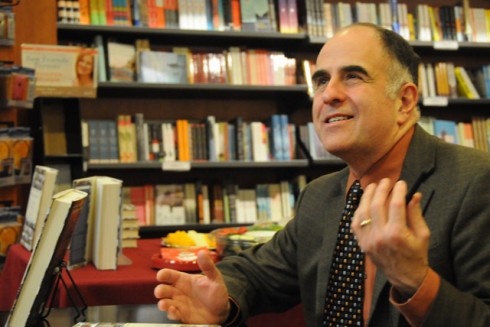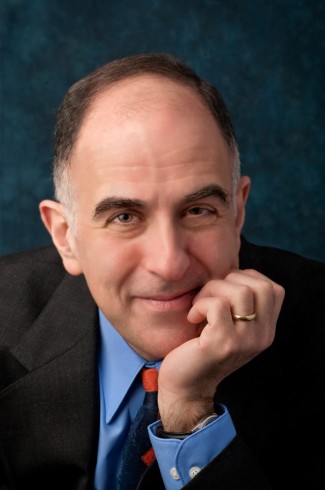Richard Grossman, professor of economics, recently co-authored an article titled “Before the Cult of Equity: the British Stock Market, 1829-1929” in European Review of Economic History, published on March 24, 2021. According to the paper's abstract, the co-authors "analyze the development and performance of the British equity market during the era when it reigned supreme as the largest in the world. By using an extensive monthly dataset of thousands of companies, we identify the major peaks and troughs in the market and find a relationship with the timing of economic cycles. We also show that the equity risk premium was…
Richard Grossman, professor and chair of economics, is an expert in economic history as well as current policy issues in macroeconomics, banking, and finance. In this Q&A, we asked him about the economic fallout from the coronavirus pandemic, and how the government is responding in efforts to mitigate the damage. Q: We’ve all seen the headlines about a coronavirus-induced recession. What is the current state of the economy, and what do you predict we’ll see over the coming months? A: Prior to the virus outbreak, the American economy was doing well by conventional standards. The unemployment rate was 3.5% in…
On Oct. 16, Richard Grossman, chair and professor of economics, discussed the latest unemployment numbers and current state of the economy with Todd Feinburg at WTIC in Hartford. This month, the national unemployment rate has fallen to a new low—3.5%. "Historically, and certainly for the last 10 years, the number peaked at 10% after the financial crisis, and it's been working its way down ever since," Grossman said. "That doesn't mean all is wonderful if you're in the labor force. There's a lot of other things going on ... people working part-time who would like to be working full-time ...…
Richard Grossman, professor of economics, authored a blog post on the Vox CEPR website with Gareth Campbell and John Turner (Queen’s University Belfast) titled, “New monthly indices of the British stock market, 1829-1929." Although long-run stock market data are an important indicator, obtaining them is challenging. This column constructs new long-run broad-based indices of equities traded on British securities markets for the period 1829-1929 and combines them with a more recent index to examine the timing of British business cycles and compare returns on home and foreign UK investment. One finding is that the capital gains index of blue-chip companies…
Wesleyan faculty frequently publish articles based on their scholarship in The Conversation US, a nonprofit news organization with the tagline, “Academic rigor, journalistic flair.” In a new article, Professor and Chair of Economics Richard Grossman analyzes the latest jobs report. May jobs report suggests a slowing economy – and possibly an imminent interest rate cut The latest jobs data suggests an interest rate cut may be imminent. The Labor Department reported on June 7 that U.S. nonfarm payroll employment increased by 75,000 in May, while the unemployment rate remained unchanged at 3.6%. This level of job creation was well below economists’ forecasts…
Professor of Economics Richard Grossman was asked by Wales Online about his expectations for the economic impact of Brexit over the next few years. He said: "Leaving the European Union will be a drag on the British economy in the medium term. Even before Brexit takes effect, however, the economy will be hurt by two factors: expectations and uncertainty. “The expectation that the UK will no longer have free access to the European market may lead exporters to reorient production toward domestic consumption or export to non-EU regions well before Brexit comes into force. UK-based financial firms may shift operations to EU…
On June 23, Professor of Economics Richard Grossman presented a paper at an economic history symposium jointly sponsored by the Bank of England and the the Centre for Economic Policy Research. Titled, "Beresford's Revenge: British equity holdings in Latin America, 1869-1929," the paper looks at stock market returns of Latin American firms traded on the London Stock Exchange. The program for the conference can be seen here.
Professor of Economics Richard Grossman tells his students that getting closer to the truth is what economic research is all about. That's why he was so dismayed when "my devotion to, and belief in, the truth was battered by the presidential election," he writes in an op-ed on The Hill. He writes: It turns out that polling data and analysis contained very little truth. The news were no better. The mainstream media got many things wrong. And there was no shortage of fake news. Although peddled as the real thing, it really wasn’t even trying to provide truth, only to shape opinion.…
As part of the “A Vanished Port” series, Richard Grossman, professor of economics, presented a lecture titled, “How Rich Was Rich,” at the Russell Library in Middletown, Conn. on Nov. 9. The lecture came as part of a newly opened exhibit at the Middlesex County Historical Society. “A Vanished Port: Middletown and the Caribbean, 1750-1824,” takes objects and documents from the time period to illustrate the “culture of prosperity that grew from Middletown’s trade relationships with the slave-worked sugar plantations of the English Caribbean.” Using Middletown merchant, Richard Alsop, who died in 1776 with a huge estate that included property, possessions,…
At Queen’s University, in Belfast, Northern Ireland, Richard Grossman, professor of economics, was appointed to the International Advisory Board of Queen’s University Center for Economic History, where he will advise on the university’s many economic programs. Grossman also served as an external examiner on a PhD thesis titled, “Bears and Bubbles in Financial Markets: Essays on the British Bicycle Mania,” at Queen’s University. Grossman also presented his co-authored papers “Beresford’s Revenge: British equity holdings in Latin America, 1869-1929,” and “Long-Run Patters and Shifts in Wealth—Insights from Irish Share Prices since 1825,” Sept. 1-2 at the 6th Eurhistock Conference, a conference focusing on the history…
Richard Grossman, professor of economics, and Masami Imai, professor and chair of economics, professor of East Asian studies, are the authors of an article published January 2016 in Explorations in Economic History. The article is titled "Taking the lord's name in vain: The impact of connected directors on 19th century British banks." Grossman and Imai considered the appointment of prominent, well-connected individuals (former members of Parliament and lords) to the boards of directors of banks in pre-World War I Britain, and investigated whether their presence enhanced equity value for bank shareholders. Surprisingly, they found that these individuals actually had negative effects on bank equity returns. The…
Richard Grossman, professor of economics, and Masami Imai, professor and chair of economics, professor of East Asian studies, are the authors of an op-ed published in The Guardian about House Speaker John Boehner's likely next move when he retires from Congress. The op-ed is titled "Whoever hires John Boehner post-Congress will make a terrible investment." They anticipate that, like most former members of Congress and high ranking members of the executive branch, Boehner is likely to have his pick of lucrative job offers—to become an investment banker, lobbyist or corporate adviser. "But for any of these companies, John Boehner would be…



